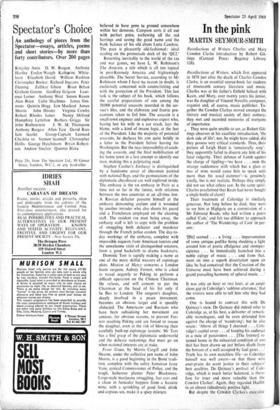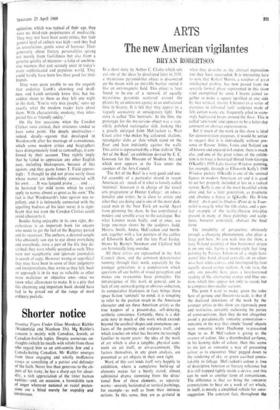In the pink
MARTIN SEYMOUR-SMITH
Recollections of Writers Charles and Mary Cowden Clarke introduction by Robert Git- tings (Centaur Press: Regency Library 126).
Recollections of Writers, which first appeared in 1878 just after the death of Charles Cowden Clarke, is an essential source-book for students of nineteenth century literature and music. Charles was at his father's Enfield School with Keats, and Mary, over twenty years his junior, was the daughter of Vincent Novello, composer, organist and, of course, music publisher. To- gether the Cowden Clarkes moved amongst the literary and musical society of their century; they met and recorded memories of everyone of importance.
„ They were quite unable to see, as Robert Git- tings observes in his excellent introduction, 'the dark side of life'; nor, be might have added, did they possess very critical standards. Thus, their picture of Leigh Hunt is 'unnaturally rosy': they apparently failed to discern any hint of his fatal vulgarity. Their defence of Lamb against the charge of tippling—'we have . . _seen the strange suddenness with which but a glass or two of wine would cause him to speak with more than his usual stammer'—is genuinely kindly, but is not realistic. Perhaps they simply did not see what others saw. In the same spirit, Charles proclaimed that Keats had never bought a single bottle of claret!
Their treatment of Coleridge is similarly generous. Not long before he died, they went to see him at Highgate on a commission of a Mr Edmund Reade, who had written a poem called 'Cain,' and felt too diffident to approach the author of 'The Wanderings of Cain' in per- son: '[He] seemed . . . a living . . . impersonation of some antique godlike being shedding a light around him of poetic _effulgence and omniper- cipience . . . he immediately launched into a noble eulogy of music . . . and from that, went on into a superb dissertation upon an idea he had conceived that the Creation of the Universe must have been achieved during a grand prevailing harmony of spheral music ...'
It was only an hour or two later, at an auspi- cious gap in Coleridge's 'sublime utterance,' that the visitors were able to tell him why they had come.
One is bound to contrast this with De Quincey's view. De Quincey did indeed refer to Coleridge as, at his best, a deliverer of remark- able monologuei, and he even defended him against the charge of `wandering'; but he also wrote: 'Above all things I shunned . . . Cole- ridge's capital error . .. of keeping his audience in a state, of passiveness . . . [The listener] -re- turned home in the exhausted condition of one. that has been drawn up just before death from the bottom of a well occupied by foul gases . Truth has its own matchless life—as Coleridge himself was well aware—so that those who over-praise do scant justice to their subjects' best qualities. De Quincey's portrait of ,Cole- ridge, which is much better balanced, is there- fore far truer and more valuable than the Cowden Clarkes'. Again, they regarded Hazlitt in an almost ridiculously positive light.
But despite the Cowden Clarkes's .exces.sive optimism, which was typical of their age, they were no third-rate perpetuators of mediocrity. They may not have been acute critics, but their general level of culture was high—and they had an unmalicious, gentle sense of humour. Their generosity about literary personalities sprang not merely from foolishness but also from a genuine quality of niceness—a kind of unobtru- sive niceness that can scarcely exist in today's more sophisticated and populous world. They could hardly have been less than good for their friends.
They were quite unable to see the anguish that underlay Lamb's clowning and droll- ness, and Lamb certainly knew this; but his sudden shout to them as they left one night in the dark, 'You're very nice people,' sums up exactly what the modern reader feels about them. With characteristic modesty,•they inter- preted this as 'friendly oddity.'
On the few occasions when the Cowden Clarkes were critical, their strictures tended to
have some point. The deeply unattractive—
indeed, deadly—egoism that developed in Wordsworth after his marriage of convenience, which some modern critics and biographers have disingenuously tried to camouflage, is con- firmed by their account. They rightly imply that he failed to appreciate any other English poet, including Shakespeare, because of this egoism; and they quote James T. Field approv- ingly: 'I thought he did not praise easily those whose names are indissolubly connected with his own . . . It was languid praise . . . and . . .
he hesitated for mild terms which he could apply to names almost as great as his own.' The fact is that Wordsworth's later egoism was re- pellent, and it is intimately connected with the appalling badness of his later verse; it is signi- ficant that not even the Cowden Clarkes could avoid allusion to it.
Besides being enjoyable in its own right,'Re- collections is an important book for anyone who needs to get the feel of the Regency period and its successor. The authors, a devoted couple Who obviously saw eye to eye about everything and everybody, were a part of the life they de- scribed; they were wholly accepted as such. They were not sycophantic and ignorant journalists in search of copy. However wrong or superficial they may have been in some of their judgirients and interpretations, they wrote as they felt. Such an approach is in its way as valuable as other more malicious or objective ones—once we know what allowances to make. It is a pity that this charming and important book should have had to be priced out of the range of most ordinary pockets.











































 Previous page
Previous page